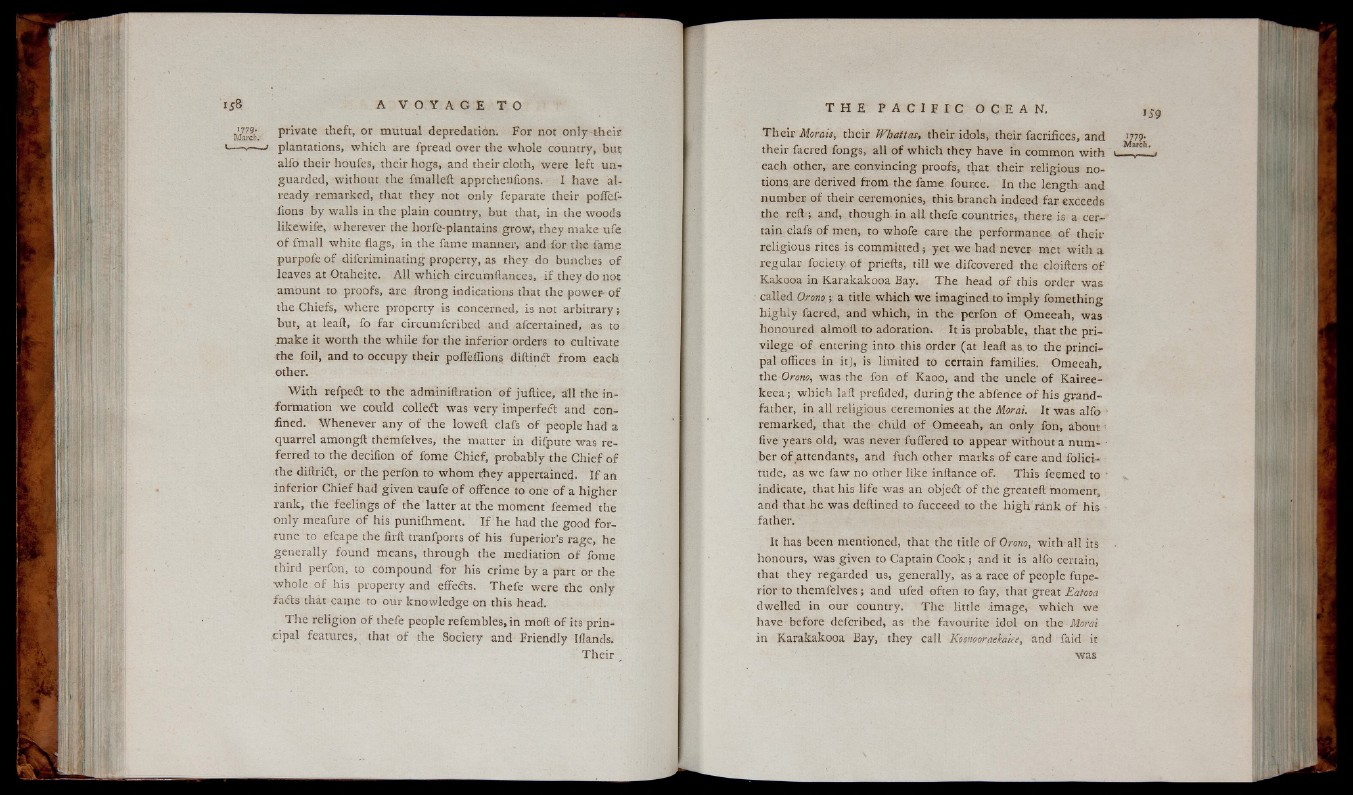
¿ 779- private theft, or mutual depredation. For not only-their
— v~~-> plantations, which are fpread over the whole country, but
alfo their houfes, their hogs, and their cloth, were left un->
guarded, without the fmalleft apprehenfions. I have already
remarked, that they not only feparate their poflef-
fions by walls in the plain country, but that, in the woods
likewife, wherever the horfe-plantains grow, they make ufe
o f fmall white flags, in the fame manner, and for the fame
purpofe o f difcriminating property, as they do bunches o f
leaves at Otaheite. All which circumftances, i f they do not
amount to proofs, are ftrong indications that the power- o f
the Chiefs, where property is concerned, is not arbitrary}
but, at leaft, fo far circumfcribed and afcertained, as to
make it worth the while for the inferior orders to cultivate
the foil, and to occupy their pofleflions diftinft from each
other.
With refpect to the adnainiftration o f juftice, all the information
we could colleft was very imperfect and confined.
Whenever any o f the loweft clafs o f people had a
quarrel amongft themfelves, the matter in difpute was referred
to the decifion of fome Chief, probably the Chief o f
,the diftridt, or the perfon to whom they appertained. I f an
inferior Chief had given taufe o f offence to one o f a higher
rank, the feelings o f the latter at the moment feemed the
only meafure o f his puniihment. I f he had the good fortune
to efcape the firft tranfports o f his fuperior’s rage, he
generally found means, through the mediation o f fome
third perfon, to compound for his crime by a part or the
whole o f his property and effedts. Thefe were the only
facts that came to our knowledge on this head.
The religion o f thefe people refembles, in moft o f its principal
features, that o f the Society and Friendly Iflands.
Their |
Their Morais, their Whattas, their idols, their facrifices, and '77?-
their facred fongs, all o f which they have in common with ■
each other, are convincing proofs, that their religious notions
are derived from the fame fource. In the length and
number of their ceremonies, this branch indeed far exceeds
the reft ; and, though in all thefe countries, there is a certain
clafs o f men, to whofe care the performance o f their
religious rites is committed; yet we had never met with a
regular fociety o f priefts, till we difcovered the cloifters o f
Kakooa in Karakakooa Bay. The head o f this order was
called Orono ; a title which we imagined to imply fomething
highly facred, and which, in the perfon o f Omeeah, was
honoured almoft to adoration. It is probable, that the privilege
o f entering into this order (at leaft as to the principal
offices in it), is limited to certain families. Omeeah,
the Orono, was the fon o f Kaoo, and the uncle o f Kairee-
keea; which l a f t preiided, during the abfence o f his grandfather,
in all religious ceremonies at the Moral. It was alfo
remarked, that the child of Omeeah, an only fon, about
five years old, was never fuffered to appear without a number
o f attendants, and fuch other marks o f care and folici-
tude, as we faw no other like inftance of. This feemed to i
indicate, that his life was an objeft o f the greateft moment,
and that he was deftined to fucceed to the high rank o f his
father.
It has been mentioned, that the title o f OroM«, with all its
honours, was given to Captain Cook ; and it is alfo certain,
that they regarded us, generally, as a race o f people fupe-
rior to themfelves; and ufed often to fay, that great Eatooa
dwelled in our country. The little -image, which we
have before defcribed, as the favourite idol on the Marai
in Karakakooa Bay, they call Kocmooraekaiee, and faid it
was